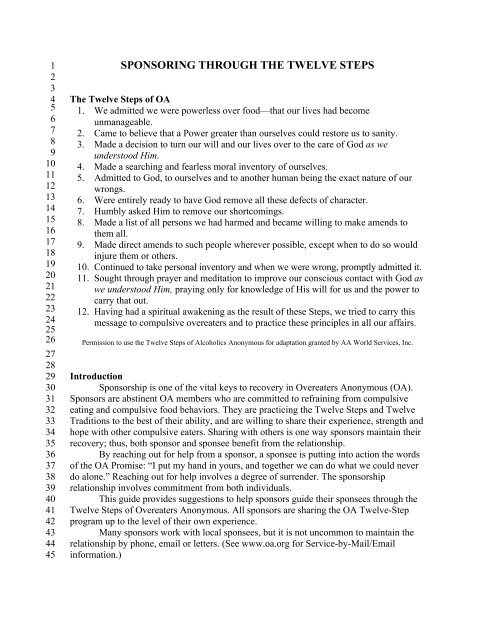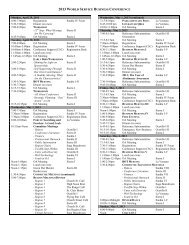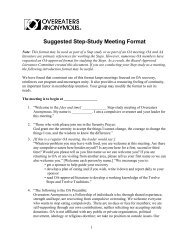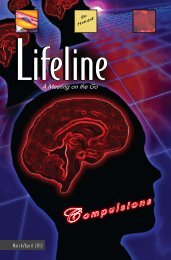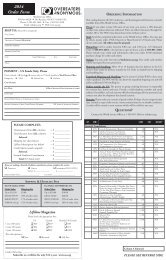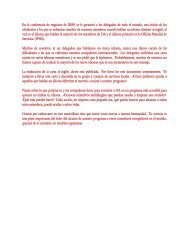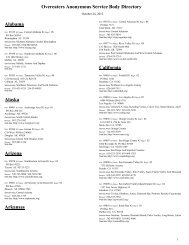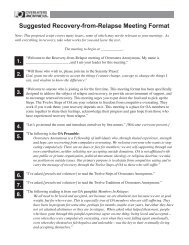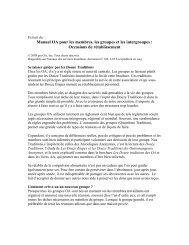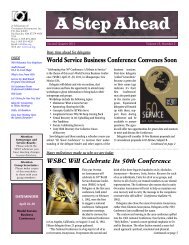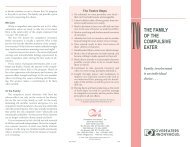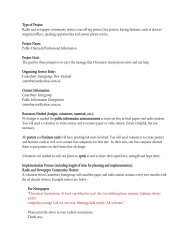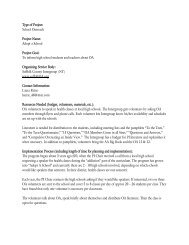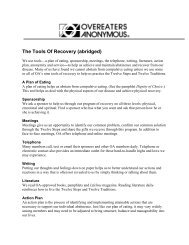sponsoring through the twelve steps - Overeaters Anonymous
sponsoring through the twelve steps - Overeaters Anonymous
sponsoring through the twelve steps - Overeaters Anonymous
Create successful ePaper yourself
Turn your PDF publications into a flip-book with our unique Google optimized e-Paper software.
1<br />
2<br />
3<br />
4<br />
5<br />
6<br />
7<br />
8<br />
9<br />
10<br />
11<br />
12<br />
13<br />
14<br />
15<br />
16<br />
17<br />
18<br />
19<br />
20<br />
21<br />
22<br />
23<br />
24<br />
25<br />
26<br />
27<br />
28<br />
29<br />
30<br />
31<br />
32<br />
33<br />
34<br />
35<br />
36<br />
37<br />
38<br />
39<br />
40<br />
41<br />
42<br />
43<br />
44<br />
45<br />
SPONSORING THROUGH THE TWELVE STEPS<br />
The Twelve Steps of OA<br />
1. We admitted we were powerless over food—that our lives had become<br />
unmanageable.<br />
2. Came to believe that a Power greater than ourselves could restore us to sanity.<br />
3. Made a decision to turn our will and our lives over to <strong>the</strong> care of God as we<br />
understood Him.<br />
4. Made a searching and fearless moral inventory of ourselves.<br />
5. Admitted to God, to ourselves and to ano<strong>the</strong>r human being <strong>the</strong> exact nature of our<br />
wrongs.<br />
6. Were entirely ready to have God remove all <strong>the</strong>se defects of character.<br />
7. Humbly asked Him to remove our shortcomings.<br />
8. Made a list of all persons we had harmed and became willing to make amends to<br />
<strong>the</strong>m all.<br />
9. Made direct amends to such people wherever possible, except when to do so would<br />
injure <strong>the</strong>m or o<strong>the</strong>rs.<br />
10. Continued to take personal inventory and when we were wrong, promptly admitted it.<br />
11. Sought <strong>through</strong> prayer and meditation to improve our conscious contact with God as<br />
we understood Him, praying only for knowledge of His will for us and <strong>the</strong> power to<br />
carry that out.<br />
12. Having had a spiritual awakening as <strong>the</strong> result of <strong>the</strong>se Steps, we tried to carry this<br />
message to compulsive overeaters and to practice <strong>the</strong>se principles in all our affairs.<br />
Permission to use <strong>the</strong> Twelve Steps of Alcoholics <strong>Anonymous</strong> for adaptation granted by AA World Services, Inc.<br />
Introduction<br />
Sponsorship is one of <strong>the</strong> vital keys to recovery in <strong>Overeaters</strong> <strong>Anonymous</strong> (OA).<br />
Sponsors are abstinent OA members who are committed to refraining from compulsive<br />
eating and compulsive food behaviors. They are practicing <strong>the</strong> Twelve Steps and Twelve<br />
Traditions to <strong>the</strong> best of <strong>the</strong>ir ability, and are willing to share <strong>the</strong>ir experience, strength and<br />
hope with o<strong>the</strong>r compulsive eaters. Sharing with o<strong>the</strong>rs is one way sponsors maintain <strong>the</strong>ir<br />
recovery; thus, both sponsor and sponsee benefit from <strong>the</strong> relationship.<br />
By reaching out for help from a sponsor, a sponsee is putting into action <strong>the</strong> words<br />
of <strong>the</strong> OA Promise: “I put my hand in yours, and toge<strong>the</strong>r we can do what we could never<br />
do alone.” Reaching out for help involves a degree of surrender. The sponsorship<br />
relationship involves commitment from both individuals.<br />
This guide provides suggestions to help sponsors guide <strong>the</strong>ir sponsees <strong>through</strong> <strong>the</strong><br />
Twelve Steps of <strong>Overeaters</strong> <strong>Anonymous</strong>. All sponsors are sharing <strong>the</strong> OA Twelve-Step<br />
program up to <strong>the</strong> level of <strong>the</strong>ir own experience.<br />
Many sponsors work with local sponsees, but it is not uncommon to maintain <strong>the</strong><br />
relationship by phone, email or letters. (See www.oa.org for Service-by-Mail/Email<br />
information.)
46<br />
47<br />
48<br />
49<br />
50<br />
51<br />
52<br />
53<br />
54<br />
55<br />
56<br />
57<br />
58<br />
59<br />
60<br />
61<br />
62<br />
63<br />
64<br />
65<br />
66<br />
67<br />
68<br />
69<br />
70<br />
71<br />
72<br />
73<br />
74<br />
75<br />
76<br />
77<br />
78<br />
79<br />
80<br />
81<br />
82<br />
83<br />
84<br />
85<br />
86<br />
87<br />
88<br />
89<br />
90<br />
Some sponsors take a highly structured approach; o<strong>the</strong>rs are easygoing and<br />
flexible. Since ours is a disease of isolation, sponsors encourage <strong>the</strong>ir sponsees to develop<br />
<strong>the</strong> habit of reaching out for help. It is usually <strong>the</strong> sponsee’s responsibility to contact <strong>the</strong><br />
sponsor. Some sponsors designate specific times for sponsees to contact <strong>the</strong>m, while o<strong>the</strong>rs<br />
are available at any time. Whatever guidelines you use, sharing your experience, strength<br />
and hope is as essential to being a good sponsor as is careful listening.<br />
If you and o<strong>the</strong>rs in your area are all new to OA, we suggest that you pair up and<br />
help each o<strong>the</strong>r use this guide. You can better understand methods of working <strong>the</strong> Steps<br />
with ano<strong>the</strong>r person by attending Step-study meetings or by discussing sponsorship<br />
problems with o<strong>the</strong>r sponsors. But in general, <strong>the</strong> best way to learn to be a sponsor is to<br />
have a sponsor.<br />
The Twelve Steps of <strong>Overeaters</strong> <strong>Anonymous</strong><br />
The Twelve Steps are <strong>the</strong> heart of our program. Without <strong>the</strong>m <strong>Overeaters</strong><br />
<strong>Anonymous</strong> would be just ano<strong>the</strong>r diet club.<br />
Reading OA-approved literature is an excellent way for sponsees to learn about<br />
<strong>the</strong>se life-changing Steps.<br />
This includes<br />
The Twelve Steps and Twelve Traditions of <strong>Overeaters</strong> <strong>Anonymous</strong>, commonly<br />
referred to as <strong>the</strong> OA “Twelve and Twelve”;<br />
A Guide for Sponsors, which includes 30 questions to acquaint <strong>the</strong> sponsee with<br />
<strong>the</strong> first three Steps of <strong>the</strong> OA recovery program; and<br />
The Twelve-Step Workbook of <strong>Overeaters</strong> <strong>Anonymous</strong>, which helps sponsees<br />
streng<strong>the</strong>n <strong>the</strong>ir program by answering thought-provoking questions drawn from<br />
<strong>the</strong> OA “Twelve and Twelve.”<br />
O<strong>the</strong>r helpful publications include Alcoholics <strong>Anonymous</strong>, commonly referred to as<br />
<strong>the</strong> Big Book (specifically, <strong>the</strong> preface <strong>through</strong> page 103) and AA’s Twelve Steps and<br />
Twelve Traditions (<strong>the</strong> AA “Twelve and Twelve”). Many OA members have learned from<br />
experience that <strong>the</strong> suggestions in AA literature also work for food compulsions and<br />
obsessions.<br />
If someone wants your help in working <strong>the</strong> Steps, it is useful to have information<br />
on common practices. Most sponsors feel that frequent or daily contact is most beneficial.<br />
Meeting with your sponsee is a good time to read <strong>the</strong> literature, discuss <strong>the</strong> Steps and<br />
address questions or comments that may arise. Help your sponsee understand each Step by<br />
recommending specific reading assignments from <strong>the</strong> “Twelve and Twelve” literature and<br />
<strong>the</strong> Big Book. The sponsee will gain deeper understanding by writing answers to Step<br />
questions ra<strong>the</strong>r than by discussion alone. Sponsors often do <strong>the</strong> same writing assignments<br />
as <strong>the</strong>ir sponsees, sharing <strong>the</strong>ir written answers after <strong>the</strong> sponsees read <strong>the</strong>irs.<br />
The first few weeks of <strong>the</strong> <strong>sponsoring</strong> relationship are a good time for <strong>the</strong> sponsee<br />
to create and begin to follow a plan of eating, possibly weighing and measuring food<br />
portions; report regularly to a sponsor; accept some <strong>sponsoring</strong> guidelines; attend<br />
meetings; and get acquainted with using <strong>the</strong> tools of <strong>the</strong> program.<br />
OA literature recommends visiting a qualified health-care professional such as a<br />
nutritionist, dietitian or doctor to assist in developing healthy eating practices. The OA<br />
pamphlet Dignity of Choice also offers ideas for suggested plans of eating.<br />
2
91<br />
92<br />
93<br />
94<br />
95<br />
96<br />
97<br />
98<br />
99<br />
100<br />
101<br />
102<br />
103<br />
104<br />
105<br />
106<br />
107<br />
108<br />
109<br />
110<br />
111<br />
112<br />
113<br />
Some sponsors and sponsees may choose to keep <strong>the</strong>ir relationship anonymous.<br />
O<strong>the</strong>rs will be happy to be open about <strong>the</strong>ir sponsorship relationship. The OA Anonymity<br />
booklet and The Tools of Recovery pamphlet explain anonymity and its importance. It is<br />
also important that <strong>the</strong> sponsor and sponsee commit <strong>the</strong>mselves to being completely honest<br />
with each o<strong>the</strong>r.<br />
Sponsees Becoming Sponsors<br />
At certain points in <strong>the</strong> <strong>sponsoring</strong> relationship, it is appropriate to encourage your<br />
sponsees to indicate at meetings that <strong>the</strong>y are qualified sponsors. By sharing up to <strong>the</strong>ir<br />
level of experience, <strong>the</strong>y can start giving back what <strong>the</strong>y have received in order to maintain<br />
spiritual recovery and abstinence. While <strong>the</strong> Steps are ongoing, <strong>the</strong> initial completion of<br />
Steps Three, Four, Five, Ten and Twelve are especially appropriate times to do this.<br />
You may also consider introducing <strong>the</strong> sponsee yourself. If you want to maintain<br />
your <strong>sponsoring</strong> anonymity, you can ask <strong>the</strong> group secretary to do <strong>the</strong> introduction.<br />
NOTE: Throughout this pamphlet, all references to <strong>the</strong> “Twelve and Twelve” literature<br />
include both <strong>the</strong> OA and AA books. All references to <strong>the</strong> Big Book are to <strong>the</strong> 4 th edition.<br />
3
113<br />
114<br />
115<br />
116<br />
117<br />
118<br />
119<br />
120<br />
121<br />
122<br />
123<br />
124<br />
125<br />
126<br />
127<br />
128<br />
129<br />
130<br />
131<br />
132<br />
133<br />
134<br />
135<br />
136<br />
137<br />
138<br />
139<br />
140<br />
141<br />
142<br />
143<br />
144<br />
145<br />
146<br />
147<br />
148<br />
149<br />
150<br />
151<br />
STEP ONE: We admitted we were powerless over food—that our lives had become<br />
unmanageable.<br />
Step One has two parts: admitting powerlessness and admitting unmanageability.<br />
To better understand <strong>the</strong>se concepts, sponsors will have <strong>the</strong>ir sponsees read Step<br />
information, ei<strong>the</strong>r alone or with <strong>the</strong> sponsor. Suggest reading Step One from <strong>the</strong> “Twelve<br />
and Twelve” literature. Discussing <strong>the</strong> ideas or questions that arise from <strong>the</strong>se readings can<br />
help in understanding compulsive eating as a serious three-fold disease.<br />
Following are examples of questions to use in discussion or writing assignments:<br />
How do you know you are a compulsive eater?<br />
What evidence shows that you are powerless over food?<br />
What methods have you used to control your eating or weight?<br />
When do you first remember being unhappy about your size or eating behaviors?<br />
What were <strong>the</strong> results of your last binge?<br />
How can compulsive eating be a matter of life or death?<br />
Is <strong>the</strong>re any o<strong>the</strong>r diet or weight-loss program you want to try?<br />
Can you trust yourself with food?<br />
Do you feel defeated by food?<br />
Are you willing to go to any length to recover?<br />
What does “going to any length” mean to you?<br />
How has food made your life unmanageable?<br />
Do parts of your life seem out of control?<br />
Recount your eating history.<br />
If sponsees are not sure <strong>the</strong>y are ready to follow a plan of eating or to work <strong>the</strong><br />
Steps, <strong>the</strong>y will still benefit from attending more meetings or talking to o<strong>the</strong>r OA<br />
members. If sponsees want to try methods o<strong>the</strong>r than OA (or o<strong>the</strong>r methods in addition to<br />
OA) to recover from compulsive eating and compulsive food behaviors, encourage <strong>the</strong>m to<br />
do so. Sponsors share <strong>the</strong>ir experience, strength and hope with sponsees. OA welcomes all<br />
who have a desire to stop eating compulsively.<br />
If your sponsee is following suggestions and shows a willingness to embrace <strong>the</strong><br />
program, continue sharing your experience of working <strong>the</strong> Steps and go on to Step Two.<br />
STEP TWO: Came to believe that a Power greater than ourselves could restore us to<br />
sanity.<br />
Like Step One, Step Two has two components: coming to believe and accepting <strong>the</strong><br />
need to have sanity restored. A commonly accepted definition of insanity is “doing <strong>the</strong><br />
same thing and expecting a different result.” Some sponsors discuss <strong>the</strong> idea of insanity<br />
first, <strong>the</strong>n <strong>the</strong> belief in a power greater than ourselves. Whichever approach you use, being<br />
powerless necessitates finding some kind of power to do <strong>the</strong> seemingly impossible. To<br />
4
152<br />
153<br />
154<br />
155<br />
156<br />
157<br />
158<br />
159<br />
160<br />
161<br />
162<br />
163<br />
164<br />
165<br />
166<br />
167<br />
168<br />
169<br />
170<br />
171<br />
172<br />
173<br />
174<br />
175<br />
176<br />
177<br />
178<br />
179<br />
180<br />
181<br />
182<br />
183<br />
184<br />
185<br />
186<br />
187<br />
188<br />
189<br />
190<br />
help with this process, suggest that your sponsee read Step Two in <strong>the</strong> “Twelve and<br />
Twelve” literature.<br />
After attending meetings and seeing <strong>the</strong> recovery of o<strong>the</strong>r OA members, some<br />
sponsees, particularly those who are agnostics or a<strong>the</strong>ists, come to believe in <strong>the</strong> OA<br />
Fellowship and its tools as powers greater than <strong>the</strong>mselves. Although Step Two does not<br />
mention God, some people may turn to a Higher Power from an organized religion or <strong>the</strong>ir<br />
childhood understanding.<br />
Honesty, willingness and open-mindedness are all that are necessary for sponsees<br />
to move <strong>through</strong> this Step, whe<strong>the</strong>r <strong>the</strong>y come into OA with a strong faith or with an<br />
agnostic or a<strong>the</strong>istic disposition. As <strong>the</strong> OA “Twelve and Twelve” points out, we can “set<br />
aside <strong>the</strong>ological arguments and examine <strong>the</strong> idea of spiritual power in <strong>the</strong> light of our own<br />
desperate need for help with our lives” (p. 14).<br />
Some of <strong>the</strong>se questions may be useful:<br />
Have you demonstrated insane behaviors concerning food?<br />
Do you believe you need to be restored to sanity?<br />
Have you come to believe recovery is possible?<br />
Being powerless over food, can you see <strong>the</strong> need to find a Higher Power to help<br />
you recover?<br />
What powers are greater than you are?<br />
What in <strong>the</strong> OA program has helped you thus far?<br />
What do you believe has <strong>the</strong> power to restore you to sanity?<br />
Are you willing to believe in a power greater than you are?<br />
One definition of a compulsion is “an irresistible urge to perform an irrational act.”<br />
Giving socially acceptable reasons for socially unacceptable behavior is rationalizing.<br />
Although compulsive overeaters may be rational in many respects, most have been insane<br />
with <strong>the</strong>ir eating behaviors. Many OA members admit to rationalizing and making excuses<br />
for compulsive eating. Generate discussion about compulsions and insane behaviors by<br />
asking questions such as <strong>the</strong> following:<br />
Do you continue to expect different results from <strong>the</strong> same behaviors?<br />
Do you have irresistible urges to eat or control your food?<br />
Do you make excuses for or rationalize your eating behaviors?<br />
Have you ever considered that compulsive eating is not rational or sane?<br />
Do you have difficulty believing <strong>the</strong> evidence shown in <strong>the</strong> mirror, on <strong>the</strong> scales or<br />
by clo<strong>the</strong>s that don’t fit?<br />
What are irrational ways in which you use food?<br />
Have you ever exhibited unacceptable eating behaviors alone or with o<strong>the</strong>rs?<br />
Do you binge, purge, sneak, hide or restrict food?<br />
Is it impossible to stop your eating behaviors despite feelings of humiliation, shame<br />
and remorse?<br />
5
191<br />
192<br />
193<br />
194<br />
195<br />
196<br />
197<br />
198<br />
199<br />
200<br />
201<br />
202<br />
203<br />
204<br />
205<br />
206<br />
207<br />
208<br />
209<br />
210<br />
211<br />
212<br />
213<br />
214<br />
215<br />
216<br />
217<br />
218<br />
219<br />
220<br />
221<br />
222<br />
223<br />
224<br />
225<br />
226<br />
227<br />
228<br />
229<br />
230<br />
231<br />
Have critical health conditions been brought on or worsened by compulsive eating?<br />
Have you bought excess food with money that should have been used for o<strong>the</strong>r<br />
needs?<br />
Have you ever contemplated or attempted suicide?<br />
Is food a power greater than yourself?<br />
Ask your sponsee(s) if <strong>the</strong>y have come to believe that a power greater than<br />
<strong>the</strong>mselves can restore <strong>the</strong>m to sanity. If a sponsee indicates even a willingness to believe,<br />
he or she is ready for Step Three.<br />
STEP THREE: Made a decision to turn our will and our lives over to <strong>the</strong> care of God<br />
as we understood Him.<br />
A sponsee can prepare for this Step by reading Step Three in <strong>the</strong> “Twelve and<br />
Twelve” literature.<br />
The symptoms of food compulsion suggest that compulsive eating is a physical,<br />
emotional and spiritual illness. The literature explains that by correcting this spiritual<br />
disease, we can overcome physical, emotional and spiritual problems. Step Three addresses<br />
<strong>the</strong> spiritual malady, indicating that a decision to surrender to a power greater than<br />
ourselves is necessary for recovery on all three levels. To “turn our will and our lives over”<br />
to a power greater than ourselves requires willingness, surrender and humility.<br />
The Third Step gives OA members <strong>the</strong> freedom to design <strong>the</strong>ir own concept of<br />
God. Some sponsors ask <strong>the</strong>ir sponsees to write a list or job description of what <strong>the</strong>y want<br />
<strong>the</strong>ir Higher Power to be. The following questions are helpful:<br />
Who or what is <strong>the</strong> God of your understanding?<br />
Do you have fears about surrendering to something greater than yourself?<br />
What does surrender mean to you?<br />
Are you willing to try surrendering to suggestions on how to recover?<br />
Can you come up with an idea of a loving God as described in Tradition Two?<br />
Is <strong>the</strong> God you describe one that you would be willing to turn your will and life<br />
over to?<br />
Are you willing to turn your will and your life over to <strong>the</strong> care of <strong>the</strong> God of your<br />
understanding?<br />
If <strong>the</strong> sponsee has thought well about this decision and has discussed this Step<br />
thoroughly, it can be helpful to say <strong>the</strong> Third-Step Prayer toge<strong>the</strong>r (page 63 of <strong>the</strong> Big<br />
Book). Having made this decision, <strong>the</strong> sponsee is ready for Step Four.<br />
STEP FOUR: Made a searching and fearless moral inventory of ourselves.<br />
Step Four is <strong>the</strong> beginning of <strong>the</strong> recommended personal housecleaning. Directions<br />
for a written moral inventory can be found in <strong>the</strong> OA Fourth-Step Inventory Guide, Step<br />
Four in <strong>the</strong> “Twelve and Twelve” literature, or in The Twelve-Step Workbook of<br />
6
232<br />
233<br />
234<br />
235<br />
236<br />
237<br />
238<br />
239<br />
240<br />
241<br />
242<br />
243<br />
244<br />
245<br />
246<br />
247<br />
248<br />
249<br />
250<br />
251<br />
252<br />
253<br />
254<br />
255<br />
256<br />
257<br />
258<br />
259<br />
260<br />
261<br />
262<br />
263<br />
264<br />
265<br />
266<br />
267<br />
268<br />
269<br />
270<br />
<strong>Overeaters</strong> <strong>Anonymous</strong>. It can also be helpful to read <strong>the</strong> Big Book from <strong>the</strong> bottom of<br />
page 63 <strong>through</strong> <strong>the</strong> end of Chapter 5.<br />
An inventory amounts to honestly looking at facts. Although o<strong>the</strong>rs may be at fault<br />
in many instances, <strong>the</strong> inventory is about <strong>the</strong> writer and how he or she has contributed to<br />
<strong>the</strong> problems. Basic character defects include resentment, selfishness, dishonesty and fear.<br />
These shortcomings give rise to a host of related defects such as self-pity, selfcenteredness,<br />
self-righteousness, guilt, blame, jealousy, pride, arrogance, laziness,<br />
negativity, unreasonable expectations, perfectionism, hopelessness, depression, judgment<br />
and criticism. The list can go on and on. The suggested literature and discussion with o<strong>the</strong>r<br />
sponsors can shed light on how to examine <strong>the</strong>se destructive characteristics. But however<br />
<strong>the</strong> sponsee approaches <strong>the</strong> inventory, OA members have found that writing it down is<br />
essential.<br />
Formats vary for taking this Step, but many sponsors agree that resentments are <strong>the</strong><br />
number one offender. Therefore, most sponsees begin by going back <strong>through</strong> <strong>the</strong>ir lives,<br />
making a list of all persons, institutions, situations, principles and things at which <strong>the</strong>y are<br />
angry. Many people find <strong>the</strong>y have some resentment toward nearly everyone and<br />
everything.<br />
After <strong>the</strong> sponsee makes <strong>the</strong> initial grudge list, he or she lists <strong>the</strong> reasons for <strong>the</strong><br />
resentments and examines his or her wrongdoings in each situation. These wrongdoings<br />
are examples of how personal character defects add fuel to a problem and often justify<br />
negative behaviors or skew facts in favor of <strong>the</strong> sponsee. Most inventories include a<br />
section on fear, even when no resentments are connected to <strong>the</strong>m. The sponsee can address<br />
dishonesty and selfishness in all situations. The following questions are helpful:<br />
Toward whom do I feel resentful?<br />
Against what institutions, situations and principles do I hold resentments?<br />
Would I secretly like to do <strong>the</strong> same if I could get away with it?<br />
How have I contributed to <strong>the</strong> problem?<br />
What unreasonable expectations do I have?<br />
Am I asking for more than my share?<br />
Did <strong>the</strong> outcome I wanted benefit myself more than o<strong>the</strong>rs?<br />
What was I afraid of losing?<br />
What did I fear I wouldn’t get?<br />
Where have I been dishonest, selfish or inconsiderate?<br />
Whom have I hurt by my behaviors?<br />
Did I arouse jealousy, bitterness or suspicion?<br />
Where have I been at fault?<br />
What should I have done instead?<br />
What ideals do I think God would have me uphold from now on?<br />
Am I willing to pray for guidance to do <strong>the</strong> right thing in each situation?<br />
7
271<br />
272<br />
273<br />
274<br />
275<br />
276<br />
277<br />
278<br />
279<br />
280<br />
281<br />
282<br />
283<br />
284<br />
285<br />
286<br />
287<br />
288<br />
289<br />
290<br />
291<br />
292<br />
293<br />
294<br />
295<br />
296<br />
297<br />
298<br />
299<br />
300<br />
301<br />
302<br />
303<br />
304<br />
305<br />
306<br />
307<br />
308<br />
309<br />
310<br />
311<br />
312<br />
313<br />
314<br />
315<br />
Sponsors will be available for questions during <strong>the</strong> inventory process and often<br />
share <strong>the</strong>ir own experiences. Such dialog can help develop <strong>the</strong> honesty that many<br />
compulsive eaters lack in relationships. It also helps build <strong>the</strong> trust that will be needed in<br />
case <strong>the</strong> sponsor is chosen to hear <strong>the</strong> sponsee’s Fifth Step.<br />
Asking a sponsee to commit to writing regularly on Step Four, even setting aside<br />
just 10 or 15 minutes a day, works better than occasional efforts. If a sponsee gets<br />
concerned about sharing his or her Fifth Step or about making amends, remind <strong>the</strong> person<br />
to focus on <strong>the</strong> inventory and on <strong>the</strong> present ra<strong>the</strong>r than on <strong>the</strong> future.<br />
A vital part of examining <strong>the</strong> wreckage of <strong>the</strong> past is for <strong>the</strong> sponsee to honestly<br />
write down everything that has bo<strong>the</strong>red him or her. The Big Book says that by being<br />
thorough, a lot will have been written down. When <strong>the</strong> sponsee feels he or she is finished<br />
writing, ask if <strong>the</strong> sponsee has been fearless and thorough. Sponsors may also suggest that<br />
sponsees ask <strong>the</strong>ir Higher Power to show <strong>the</strong>m if <strong>the</strong>y have forgotten or omitted anything.<br />
At this point, sponsees may begin to feel remorse or even forgiveness for some of <strong>the</strong>ir<br />
actions and start taking a kindly or tolerant view toward those <strong>the</strong>y have hurt.<br />
All <strong>the</strong> sponsee needs is faith, willingness and action. He or she is now ready to<br />
take Step Five.<br />
STEP FIVE: Admitted to God, to ourselves, and to ano<strong>the</strong>r human being <strong>the</strong> exact<br />
nature of our wrongs.<br />
Step Five is next in <strong>the</strong> process of thorough housecleaning. To recover from<br />
compulsive eating, it is important for <strong>the</strong> sponsee to share <strong>the</strong> exact nature of his or her<br />
wrongs with ano<strong>the</strong>r person. While many sponsees take <strong>the</strong>ir Fifth Step with <strong>the</strong>ir sponsor,<br />
some turn <strong>the</strong>ir Fifth Step over to ano<strong>the</strong>r abstinent OA member or to a <strong>the</strong>rapist, counselor<br />
or spiritual advisor. This decision belongs entirely to <strong>the</strong> sponsee. Direct <strong>the</strong> sponsee<br />
toward <strong>the</strong> literature, which gives clear suggestions for choosing such a person.<br />
The sponsee may have developed feelings of safety and trust as <strong>the</strong> <strong>sponsoring</strong><br />
relationship has continued. If <strong>the</strong> sponsee chooses you to be <strong>the</strong> listener in this vital<br />
process, it is essential that you remain open-minded and nonjudgmental, while observing<br />
<strong>the</strong> tradition of anonymity.<br />
It may take part of a day or many meetings to do <strong>the</strong> Fifth Step with ano<strong>the</strong>r<br />
person. The sponsor and sponsee will usually meet toge<strong>the</strong>r to share <strong>the</strong> Step, sometimes<br />
starting with a prayer. However, if you have a long-distance relationship, <strong>the</strong> telephone<br />
may be <strong>the</strong> only reasonable solution. Most sponsors ask <strong>the</strong>ir sponsees to read what <strong>the</strong>y<br />
have written, although sometimes <strong>the</strong> list and writings are used for more dialog. A sponsor<br />
will listen and make helpful comments, as well as sharing insights and similar experiences.<br />
Hopefully, it will become obvious after a short time that a sponsee has thoroughly<br />
investigated his or her shortcomings. Occasionally, however, it may become clear that <strong>the</strong><br />
sponsee still has work to do. The sponsee may not have addressed large time gaps or major<br />
defects. The inventory may consist primarily of complaining, self-pity and fault-finding. In<br />
this case, it’s common for sponsors to share fur<strong>the</strong>r some of <strong>the</strong>ir own Fourth-Step writings<br />
to clarify how to take one’s own inventory.<br />
Some parts of an inventory may appear redundant. However, keep in mind that <strong>the</strong><br />
repetition may be a necessary part of <strong>the</strong> healing process.<br />
8
316<br />
317<br />
318<br />
319<br />
320<br />
321<br />
322<br />
323<br />
324<br />
325<br />
326<br />
327<br />
328<br />
329<br />
330<br />
331<br />
332<br />
333<br />
334<br />
335<br />
336<br />
337<br />
338<br />
339<br />
340<br />
341<br />
342<br />
343<br />
344<br />
345<br />
346<br />
347<br />
348<br />
349<br />
350<br />
351<br />
352<br />
353<br />
354<br />
355<br />
When sponsees have completed <strong>the</strong> Fifth Step, most sponsors ask <strong>the</strong>m to take time<br />
to reflect and pray about <strong>the</strong> process <strong>the</strong>y’ve just completed and review <strong>the</strong> Steps <strong>the</strong>y’ve<br />
taken. Sponsees can ask <strong>the</strong>mselves <strong>the</strong> following questions:<br />
Is <strong>the</strong>re anything I have omitted from this inventory?<br />
Have I shared everything with ano<strong>the</strong>r human being?<br />
Is <strong>the</strong>re anything I want to keep secret forever?<br />
Can I see fear as an underlying factor in my problems?<br />
Have I shared <strong>the</strong> exact nature of my wrongs?<br />
Have I included my Higher Power in this process?<br />
Have I been fearless and thorough to <strong>the</strong> best of my ability?<br />
Do I have a sense of relief or freedom?<br />
Have I experienced <strong>the</strong> nearness of my Higher Power?<br />
Do I believe I have begun to have a spiritual experience?<br />
Completion of Step Five leads immediately into Step Six. Sponsees should retain<br />
<strong>the</strong>ir Step-Four inventories because <strong>the</strong>y will be useful when doing Steps Eight and Nine.<br />
STEP SIX: Were entirely ready to have God remove all <strong>the</strong>se defects of character.<br />
Step Six can be relatively short, or it may include more writing. Usually sponsees<br />
take this Step after prayer and meditation. Some sponsors simply ask <strong>the</strong> question, “Are<br />
you entirely ready for God to remove all your defects of character?” If a sponsee can<br />
answer honestly that he or she is ready or willing to be ready, those sponsors consider that<br />
Step Six has been taken.<br />
O<strong>the</strong>r sponsors have <strong>the</strong>ir sponsees list all <strong>the</strong> troublesome behaviors and attitudes<br />
<strong>the</strong>y discovered while writing <strong>the</strong>ir Fourth-Step inventory, and <strong>the</strong>n examine how <strong>the</strong>se<br />
behaviors and attitudes lead to compulsive eating.<br />
Although <strong>the</strong> Big Book devotes only one short paragraph on page 76 to this Step,<br />
useful discussion can be sparked by reading Step Six in <strong>the</strong> “Twelve and Twelve”<br />
literature with your sponsee. If you ask your sponsee to list problematic traits, you can also<br />
ask <strong>the</strong> person to examine and strive for <strong>the</strong> opposite characteristics. Resentments can be<br />
replaced by practicing kindness, patience, tolerance, forgiveness and love; dishonesty by<br />
practicing honesty; selfishness by practicing consideration and compassion for o<strong>the</strong>rs; and<br />
fear by practicing faith and courage. Behaving better than how we feel and acting well in<br />
all our affairs can result in character defects being removed.<br />
The following questions can be helpful:<br />
How has each defect worked for you?<br />
How has each behavior and attitude caused you trouble?<br />
How can <strong>the</strong>se defects contribute to or affect <strong>the</strong> outcome of situations?<br />
Do you have shortcomings you want to hold on to?<br />
If so, what is <strong>the</strong> payoff?<br />
9
356<br />
357<br />
358<br />
359<br />
360<br />
361<br />
362<br />
363<br />
364<br />
365<br />
366<br />
367<br />
368<br />
369<br />
370<br />
371<br />
372<br />
373<br />
374<br />
375<br />
376<br />
377<br />
378<br />
379<br />
380<br />
381<br />
382<br />
383<br />
384<br />
385<br />
386<br />
387<br />
388<br />
389<br />
390<br />
391<br />
392<br />
393<br />
394<br />
395<br />
Are you afraid of what will happen if you let <strong>the</strong>m go?<br />
Are you willing to allow God to remove your character defects?<br />
Can you put aside old ideas that are no longer working for you?<br />
Are you willing to practice letting go of <strong>the</strong>se shortcomings?<br />
Remind sponsees that willingness is <strong>the</strong> essence of Step Six, even though a Higher<br />
Power has <strong>the</strong> job of removing character defects. If <strong>the</strong> sponsee is willing to have<br />
shortcomings removed, he or she is ready for Step Seven.<br />
STEP SEVEN: Humbly asked Him to remove our shortcomings.<br />
Step Seven points to prayer and humility, implying that both are necessary to<br />
continue taking <strong>the</strong> Steps. Humility is often considered <strong>the</strong> essence of Step Seven. Being<br />
humble might be defined as accepting things exactly as <strong>the</strong>y are. Reading and discussing<br />
Step Seven from <strong>the</strong> “Twelve and Twelve” literature can help a sponsee more fully<br />
understand <strong>the</strong> concept of humility and <strong>the</strong> part acceptance plays in this Step.<br />
Some sponsors will ask sponsees to say <strong>the</strong> Seventh-Step Prayer from page 76 in<br />
<strong>the</strong> Big Book. O<strong>the</strong>r sponsors take a more involved approach. As mentioned in <strong>the</strong> OA<br />
“Twelve and Twelve” on page 62, a sponsee “might begin with a prayer for genuine<br />
humility.” You can ask additional questions, including:<br />
What does humility mean to you?<br />
Can you see that low self-esteem, as well as pride, is evidence of a lack of<br />
humility?<br />
Have you struggled to get rid of traits you don’t like?<br />
Can you accept that some character defects may not be removed immediately?<br />
Can you see <strong>the</strong> necessity of inviting God to remove your shortcomings?<br />
Do you believe God can remove your defects?<br />
If <strong>the</strong> sponsee is ready to complete Step Seven, you might suggest saying <strong>the</strong><br />
Seventh-Step Prayer toge<strong>the</strong>r before approaching Step Eight.<br />
STEP EIGHT: Made a list of all persons we had harmed and became willing to make<br />
amends to <strong>the</strong>m all.<br />
When writing <strong>the</strong> Fourth-Step inventory, most sponsees develop a list of<br />
resentments. Sponsors usually ask <strong>the</strong>m to look over this list and write down <strong>the</strong> names of<br />
those <strong>the</strong>y have harmed as a result. To assist in deciding whe<strong>the</strong>r real harm has been done,<br />
ask <strong>the</strong> following questions:<br />
Was <strong>the</strong> harm done in thought or in action?<br />
Have your attitudes resulted in actual harm?<br />
When in doubt as to whe<strong>the</strong>r harm has been done, sponsors suggest that <strong>the</strong><br />
sponsee include those names on <strong>the</strong> list for later evaluation. Asking a Higher Power for<br />
10
396<br />
397<br />
398<br />
399<br />
400<br />
401<br />
402<br />
403<br />
404<br />
405<br />
406<br />
407<br />
408<br />
409<br />
410<br />
411<br />
412<br />
413<br />
414<br />
415<br />
416<br />
417<br />
418<br />
419<br />
420<br />
421<br />
422<br />
423<br />
424<br />
425<br />
426<br />
427<br />
428<br />
429<br />
430<br />
431<br />
432<br />
433<br />
434<br />
435<br />
436<br />
437<br />
guidance about <strong>the</strong> list and for <strong>the</strong> willingness to make amends is essential. The literature<br />
also recommends praying for <strong>the</strong> health, happiness, prosperity and benefit of those whom<br />
<strong>the</strong> sponsee has harmed. However, sometimes <strong>the</strong> willingness to right a wrong does not<br />
come easily. In such cases, you can guide <strong>the</strong> sponsee to organize <strong>the</strong> list into several<br />
sections such as:<br />
a) those to whom <strong>the</strong> sponsee is currently willing to make amends;<br />
b) amends that will require time to make, such as long-term financial restitution or<br />
amends that need fur<strong>the</strong>r thought, prayer, writing and/or discussion;<br />
c) living amends that require <strong>the</strong> sponsee not only to apologize but also to change<br />
behavior or to repair damages; and<br />
d) amends <strong>the</strong> sponsee is not yet willing to make.<br />
Reviewing Fourth-Step questions from <strong>the</strong> OA “Twelve and Twelve” can also be<br />
helpful when making such a list. After <strong>the</strong> sponsee has listed all persons who have been<br />
harmed, and if <strong>the</strong> sponsee is willing to proceed to Step Nine, <strong>the</strong>n this initial Step Eight<br />
has been completed.<br />
Many OA members find, as time goes by in recovery, that o<strong>the</strong>r Step-Eight amends<br />
reveal <strong>the</strong>mselves.<br />
STEP NINE: Made direct amends to such people wherever possible, except when to<br />
do so would injure <strong>the</strong>m or o<strong>the</strong>rs.<br />
Step Nine can help sponsees establish better relationships. Step Nine in <strong>the</strong><br />
“Twelve and Twelve” literature contains helpful information for making amends. By<br />
making amends for past behaviors, this Step allows sponsees to replace fear with faith, to<br />
build self-respect, and to begin experiencing miracles of recovery and conscious contact<br />
with a Higher Power.<br />
Step Nine completes <strong>the</strong> process begun in Step Four. As amends progress,<br />
resentments, self-pity and anger often disappear. Sponsees may also begin to experience<br />
forgiveness and compassion toward those for whom <strong>the</strong>y previously harbored negative<br />
feelings. Therefore, sponsees may find <strong>the</strong>y are no longer in bondage to compulsive<br />
overeating and self-obsession.<br />
Sponsors can reassure sponsees by sharing some of <strong>the</strong>ir own personal experiences<br />
when making amends. This will help give sponsees <strong>the</strong> courage to undertake this<br />
miraculous and transforming Step. To prepare for making each amends, sponsees can ask<br />
<strong>the</strong>mselves <strong>the</strong>se questions:<br />
What have I done to harm this person?<br />
Will I harm this person or o<strong>the</strong>rs if I make amends to him or her?<br />
Is my amends implying any wrongdoing on <strong>the</strong> o<strong>the</strong>r’s part?<br />
Have I kept my apology as short and simple as possible?<br />
Am I willing to make this amends?<br />
Do I need to ask God to give me <strong>the</strong> honesty, willingness and strength to make this<br />
apology?<br />
Do I need to do o<strong>the</strong>r amends before I’m ready to do this one?<br />
11
438<br />
439<br />
440<br />
441<br />
442<br />
443<br />
444<br />
445<br />
446<br />
447<br />
448<br />
449<br />
450<br />
451<br />
452<br />
453<br />
454<br />
455<br />
456<br />
457<br />
458<br />
459<br />
460<br />
461<br />
462<br />
463<br />
464<br />
465<br />
466<br />
467<br />
468<br />
469<br />
470<br />
471<br />
472<br />
473<br />
474<br />
475<br />
476<br />
477<br />
478<br />
479<br />
480<br />
481<br />
482<br />
Do I need to pray for this person?<br />
Is it possible for me to make direct amends with this person?<br />
What is <strong>the</strong> best way for me to make amends for this situation?<br />
What behaviors do I need to change?<br />
Have I experienced forgiveness in <strong>the</strong> process of making some of my amends?<br />
After <strong>the</strong> sponsee has listed <strong>the</strong> people who have been harmed, <strong>the</strong> sponsor can<br />
review each name with <strong>the</strong> sponsee and discuss <strong>the</strong> harm done. Then <strong>the</strong> sponsee can write<br />
down what he or she might say to <strong>the</strong> person receiving <strong>the</strong> amends. Frequently <strong>the</strong> sponsor<br />
goes over <strong>the</strong> wording with <strong>the</strong> sponsee and encourages <strong>the</strong> sponsee to eliminate any blame<br />
directed toward <strong>the</strong> person to whom <strong>the</strong> reparation is to be made.<br />
A simple, appropriate amends might include a list of defects demonstrated by <strong>the</strong><br />
sponsee’s behavior, possibly with an example of an incident, and a sincere apology for<br />
harm done. Before making <strong>the</strong> amends, sponsor and sponsee might rehearse <strong>the</strong> apology<br />
toge<strong>the</strong>r, finding <strong>the</strong> balance of being honest and considerate without groveling.<br />
It’s often best to make face-to-face amends, but <strong>the</strong> sponsee can write a letter or<br />
make a phone call for long-distance apologies. Suggest that <strong>the</strong> sponsee pray before doing<br />
each amends, asking God’s guidance and remembering that a Higher Power is in charge of<br />
<strong>the</strong> outcome.<br />
Sometimes it’s not evident that <strong>the</strong> sponsee’s behaviors have harmed ano<strong>the</strong>r<br />
person, but <strong>the</strong> sponsee may harbor resentment or ill will toward that person. In such cases,<br />
suggest that <strong>the</strong> sponsee ask God to help him or her develop a compassionate, forgiving<br />
and tolerant view toward that person. However, sponsees must not let ill feelings stop <strong>the</strong>m<br />
from taking corrective measures if <strong>the</strong>y are warranted.<br />
Most amends will require not only that a sponsee apologize, but also change<br />
behaviors, correct wrongs and, if possible, repair damages. These actions are often called<br />
“living amends.” Sponsors and sponsees usually discuss <strong>the</strong>se thoroughly and develop a<br />
plan for future behaviors. If a person cannot be contacted or amends cannot be made,<br />
suggest alternative actions such as giving to o<strong>the</strong>rs in a selfless way. Explain that we have<br />
harmed ourselves in many ways, and we can make living amends to ourselves by making<br />
amends to o<strong>the</strong>rs.<br />
While making amends, a sponsee needs to understand that “except when to do so<br />
would injure <strong>the</strong>m or o<strong>the</strong>rs” does not mean injury to <strong>the</strong> sponsee from embarrassment,<br />
fear, discomfort, financial burden or shame. Injury to o<strong>the</strong>rs might include private<br />
information that could compromise employees, family members, friends or o<strong>the</strong>rs. It is<br />
critical to recovery for <strong>the</strong> sponsee to take direction from <strong>the</strong> sponsor regarding amends<br />
that may not be appropriate.<br />
Your support and guidance are vital in Step Nine. Sponsors who have taken this<br />
Step will be able to share <strong>the</strong> joy and relief that most amends bring. Occasionally<br />
reparations may not be well-received. The point of Step Nine is for sponsees to clean <strong>the</strong>ir<br />
side of <strong>the</strong> street and let go of <strong>the</strong> results, whe<strong>the</strong>r positive or negative. It is important to<br />
remind <strong>the</strong> sponsee that whatever happens when making amends, we become closer to<br />
God, more at peace with ourselves and better able to be of service to o<strong>the</strong>rs.<br />
After sponsees have begun to make amends, some sponsors introduce <strong>the</strong>m to Steps<br />
Ten, Eleven and Twelve, since some amends (such as financial) may take years to<br />
complete. O<strong>the</strong>r sponsors, however, feel it is beneficial to finish each Step before<br />
12
483<br />
484<br />
485<br />
486<br />
487<br />
488<br />
489<br />
490<br />
491<br />
492<br />
493<br />
494<br />
495<br />
496<br />
497<br />
498<br />
499<br />
500<br />
501<br />
502<br />
503<br />
504<br />
505<br />
506<br />
507<br />
508<br />
509<br />
510<br />
511<br />
512<br />
513<br />
514<br />
515<br />
516<br />
517<br />
518<br />
519<br />
520<br />
521<br />
522<br />
523<br />
524<br />
proceeding fur<strong>the</strong>r.<br />
STEP TEN: Continued to take personal inventory and when we were wrong,<br />
promptly admitted it.<br />
Steps Ten, Eleven and Twelve are often called “maintenance,” “growth” or “living”<br />
Steps because <strong>the</strong>y enable OA members to maintain physical abstinence, emotional<br />
sobriety and spiritual well-being, and to continue improving personal relationships. Step<br />
Ten begins <strong>the</strong> process of incorporating <strong>the</strong> principles of <strong>the</strong> previous Steps into everyday<br />
life. Sponsees are directed to grow in understanding and effectiveness by continuing to<br />
watch for character defects.<br />
When discussing Step Ten, it is helpful to read <strong>the</strong> “Twelve and Twelve” literature<br />
with your sponsee. Some sponsors also refer to Step Ten in <strong>the</strong> Big Book. Explain to your<br />
sponsee that <strong>the</strong> Tenth Step may include a mental or on-<strong>the</strong>-spot examination as situations<br />
arise, using a checklist, writing, or doing a daily review with a sponsor or an OA buddy.<br />
The literature also suggests asking God to remove defects as <strong>the</strong>y appear, discussing<br />
problems with ano<strong>the</strong>r person, making amends quickly if o<strong>the</strong>rs have been harmed, and<br />
<strong>the</strong>n helping o<strong>the</strong>rs by showing kindness, patience, tolerance and love. Many OA members<br />
also take an annual in-depth inventory by reviewing old questions; taking advantage of <strong>the</strong><br />
many face-to-face, phone and online Step-Study meetings, workshops and retreats; or<br />
using a different sponsor.<br />
Although OA members generally agree that sponsees should take <strong>the</strong> Steps in<br />
order, some sponsors have <strong>the</strong>ir sponsees begin making a daily review as soon as <strong>the</strong>y can.<br />
To help with this spiritual discipline, sponsees can ask <strong>the</strong>mselves questions such<br />
as <strong>the</strong> following:<br />
Have resentment, dishonesty, selfishness or fear cropped up?<br />
Did I engage in worry, remorse, guilt or negativity?<br />
Have I asked God if corrective measures need to be taken?<br />
Do I need to discuss something with ano<strong>the</strong>r person right away?<br />
Have I harmed anyone?<br />
Do I owe an apology?<br />
Do I need to review one or more of <strong>the</strong> Steps?<br />
Is <strong>the</strong>re someone I need to help?<br />
Do my actions toward o<strong>the</strong>rs demonstrate love and tolerance?<br />
When approached with a problematic situation, you can direct your sponsees to<br />
take <strong>the</strong> new issue <strong>through</strong> <strong>the</strong> Steps. Sponsor and sponsee can begin toge<strong>the</strong>r with <strong>the</strong><br />
Serenity Prayer, and <strong>the</strong>n <strong>the</strong> sponsee can take Step One. Admitting he or she is powerless<br />
over <strong>the</strong> situation, <strong>the</strong> sponsee can list ways in which <strong>the</strong> situation is making life<br />
unmanageable.<br />
Then ask <strong>the</strong> sponsee to take Step Two, discussing and remembering how a Power<br />
greater than ourselves can return us to sanity. Step Three can lead <strong>the</strong> sponsee to decide to<br />
turn <strong>the</strong> situation over to <strong>the</strong> care of his or her Higher Power.<br />
13
525<br />
526<br />
527<br />
528<br />
529<br />
530<br />
531<br />
532<br />
533<br />
534<br />
535<br />
536<br />
537<br />
538<br />
539<br />
540<br />
541<br />
542<br />
543<br />
544<br />
545<br />
546<br />
547<br />
548<br />
549<br />
550<br />
551<br />
552<br />
553<br />
554<br />
555<br />
556<br />
557<br />
558<br />
559<br />
560<br />
561<br />
562<br />
563<br />
564<br />
565<br />
566<br />
567<br />
568<br />
Step Four will direct <strong>the</strong> sponsee to look at how he or she is contributing to <strong>the</strong><br />
problem, looking for defects, attitudes and behaviors. Step Five will be completed with an<br />
oral inventory, or can be shared after <strong>the</strong> sponsee has finished writing.<br />
You and your sponsee can <strong>the</strong>n go <strong>through</strong> Steps Six and Seven again, as discussed<br />
previously. Continuing with Steps Eight and Nine, you and your sponsee can decide if and<br />
how amends need to be made.<br />
By reviewing <strong>the</strong> “Twelve and Twelve” literature, sponsees can also explore<br />
whe<strong>the</strong>r any Traditions have not been upheld. This can help sponsees understand how to<br />
personally apply <strong>the</strong> principles contained in <strong>the</strong> Traditions, thus deepening <strong>the</strong>ir<br />
understanding of how character defects manifest <strong>the</strong>mselves. By taking this daily<br />
inventory, sponsees can minimize or prevent <strong>the</strong> return of character defects and such<br />
feelings as resentment, self-centeredness, dishonesty or fear.<br />
STEP ELEVEN: Sought <strong>through</strong> prayer and meditation to improve our conscious<br />
contact with God as we understood Him, praying only for knowledge of His will for us<br />
and <strong>the</strong> power to carry that out.<br />
Sponsors will have already introduced sponsees to <strong>the</strong> concepts of Step Eleven by<br />
encouraging <strong>the</strong>m to build a relationship with God. Having worked <strong>the</strong> previous Steps,<br />
sponsees will undoubtedly have had evidence of a Higher Power working in <strong>the</strong>ir lives.<br />
However, continuing to maintain conscious contact with God ensures <strong>the</strong> spiritual fitness<br />
necessary for continued abstinence and a life that remains happy, joyous and free.<br />
Prayer is talking to God, and meditation is listening to God. Most sponsors<br />
recognize that prayer and meditation are highly individualized practices and that <strong>the</strong>re are<br />
as many ways to pray and meditate as <strong>the</strong>re are people. However, our literature explains<br />
<strong>the</strong> importance of intentionally seeking <strong>the</strong> God of our understanding every day,<br />
developing a God consciousness, developing intuition and coming to rely on it.<br />
Step Eleven questions could include:<br />
How have I sought God’s will for myself today?<br />
Am I taking time to seek God’s will <strong>through</strong> prayer and meditation?<br />
Have I attended my regular OA meetings so I can carry <strong>the</strong> message as well as hear<br />
God’s will <strong>through</strong> <strong>the</strong> sharing of o<strong>the</strong>rs?<br />
Have I behaved towards o<strong>the</strong>rs today as God would have me?<br />
Was I <strong>the</strong> best example of <strong>the</strong> OA program that I could be today?<br />
Was I useful to o<strong>the</strong>rs?<br />
Our literature suggests contacting God upon arising to ask for guidance in planning<br />
<strong>the</strong> day. Encourage your sponsees to pray that God remove <strong>the</strong>ir self centeredness, help<br />
<strong>the</strong>m consider o<strong>the</strong>r people and give <strong>the</strong>m inspiration; and that God’s will be done. When<br />
problems arise <strong>through</strong>out <strong>the</strong> day, <strong>the</strong> sponsee can pause, ask God’s direction, and <strong>the</strong>n<br />
relax, knowing <strong>the</strong> answers will come.<br />
In addition to <strong>the</strong> above information, use Step Eleven as an opportunity for<br />
sponsees to look in depth at <strong>the</strong> Twelve Traditions. To seek spiritual growth and improved<br />
relationships with o<strong>the</strong>rs, sponsees can use writing or ano<strong>the</strong>r form of meditation to<br />
consider questions such as:<br />
14
569<br />
570<br />
571<br />
572<br />
573<br />
574<br />
575<br />
576<br />
577<br />
578<br />
579<br />
580<br />
581<br />
582<br />
583<br />
584<br />
585<br />
586<br />
587<br />
588<br />
589<br />
590<br />
591<br />
592<br />
593<br />
594<br />
595<br />
596<br />
597<br />
598<br />
599<br />
600<br />
601<br />
602<br />
603<br />
604<br />
605<br />
606<br />
607<br />
608<br />
How does each Tradition apply to my life on a personal, day-to-day level?<br />
Do I apply <strong>the</strong> principles of <strong>the</strong> Steps and Traditions in all my affairs?<br />
How has each of <strong>the</strong> promises manifested in my life?<br />
What actions am I taking to seek improved conscious contact with <strong>the</strong> God of my<br />
understanding?<br />
Have I prayed selfishly?<br />
Do I pray for knowledge of God’s will for me and <strong>the</strong> power to carry that out?<br />
How do I manifest God’s will for me during <strong>the</strong> day?<br />
As we grow in program, we learn to rely more and more on a higher spiritual<br />
power, realizing that <strong>through</strong> prayer and meditation, we will be taken care of in a way that<br />
we never thought possible.<br />
STEP TWELVE: Having had a spiritual awakening as <strong>the</strong> result of <strong>the</strong>se Steps, we<br />
tried to carry this message to compulsive overeaters and to practice <strong>the</strong>se principles<br />
in all our affairs.<br />
Arriving at Step Twelve is a gradual process ra<strong>the</strong>r than something that happens at<br />
a set point in time. It does not mean we are cured of this disease or can rest on our laurels.<br />
Practicing <strong>the</strong>se principles in all our affairs and seeking God’s will become daily<br />
disciplines and a way of life. Questions to be answered might include:<br />
How do you know you have had a spiritual awakening?<br />
What evidence do you have of a Higher Power working in your life?<br />
What are <strong>the</strong> principles you have learned from taking all Twelve Steps?<br />
In what ways do you practice <strong>the</strong>se principles in all your affairs?<br />
How do you try to carry this message to o<strong>the</strong>r compulsive overeaters?<br />
What is this message?<br />
Has your concept of God changed as a result of taking <strong>the</strong> Steps?<br />
As <strong>the</strong> OA Responsibility Pledge states, “Always to extend <strong>the</strong> hand and heart of<br />
OA to all who share my compulsion; for this I am responsible.” If your sponsee has not<br />
previously offered at meetings to sponsor someone, arriving at <strong>the</strong> Twelfth Step is a good<br />
time to do so. The new sponsor is responsible for carrying <strong>the</strong> message of <strong>the</strong> Twelve Steps<br />
to o<strong>the</strong>r compulsive eaters.<br />
Many sponsees are intimidated by <strong>the</strong> prospect of becoming a sponsor. Many<br />
sponsors, having worked with people who are eager for recovery and willing to do <strong>the</strong><br />
Steps, know <strong>the</strong> joy of carrying <strong>the</strong> message <strong>through</strong> a <strong>sponsoring</strong> relationship. As <strong>the</strong><br />
literature suggests, it is an experience that must not be missed. Our program emphasizes<br />
that working with o<strong>the</strong>rs is required for continuous recovery. This could include sharing<br />
with o<strong>the</strong>r compulsive eaters, helping at a meeting, being a sponsor, becoming involved in<br />
<strong>the</strong> OA service structure, or explaining to interested family or friends what OA is and how<br />
it works.<br />
15
609<br />
610<br />
611<br />
612<br />
613<br />
614<br />
615<br />
616<br />
617<br />
618<br />
619<br />
620<br />
621<br />
622<br />
623<br />
624<br />
625<br />
626<br />
627<br />
628<br />
629<br />
630<br />
631<br />
632<br />
633<br />
634<br />
635<br />
636<br />
637<br />
638<br />
639<br />
640<br />
641<br />
642<br />
643<br />
644<br />
645<br />
646<br />
647<br />
648<br />
649<br />
650<br />
651<br />
652<br />
None of us sponsor in isolation. A new sponsor will get much guidance by<br />
following suggestions from his or her sponsor, particularly in <strong>the</strong> early days of <strong>sponsoring</strong>.<br />
Reading Step Twelve in <strong>the</strong> “Twelve and Twelve” literature will also be helpful. We<br />
cannot keep what we have been given unless we give it away.<br />
However <strong>the</strong> message is carried, Step Twelve provides insurance that both new and<br />
longtime sponsors will continue to recover and to remain happy, joyous and free. The OA<br />
Promise sums up this message of Twelve-Step recovery:<br />
I put my hand in yours,<br />
and toge<strong>the</strong>r we can do what we could never do alone.<br />
No longer is <strong>the</strong>re a sense of hopelessness,<br />
no longer must we each depend upon our own unsteady willpower.<br />
We are all toge<strong>the</strong>r now, reaching out our hands for power and strength greater than<br />
ours, and as we join hands, we find love and understanding beyond our wildest<br />
dreams.<br />
The Twelve Traditions of OA<br />
1. Our common welfare should come first; personal recovery depends upon OA unity.<br />
2. For our group purpose <strong>the</strong>re is but one ultimate authority—a loving God as He may<br />
express Himself in our group conscience. Our leaders are but trusted servants; <strong>the</strong>y<br />
do not govern.<br />
3. The only requirement for OA membership is a desire to stop eating compulsively.<br />
4. Each group should be autonomous except in matters affecting o<strong>the</strong>r groups or OA as<br />
a whole.<br />
5. Each group has but one primary purpose—to carry its message to <strong>the</strong> compulsive<br />
overeater who still suffers.<br />
6. An OA group ought never endorse, finance or lend <strong>the</strong> OA name to any related<br />
facility or outside enterprise, lest problems of money, property and prestige divert us<br />
from our primary purpose.<br />
7. Every OA group ought to be fully self-supporting, declining outside contributions.<br />
8. <strong>Overeaters</strong> <strong>Anonymous</strong> should remain forever nonprofessional, but our service<br />
centers may employ special workers.<br />
9. OA, as such, ought never be organized; but we may create service boards or<br />
committees directly responsible to those <strong>the</strong>y serve.<br />
10. <strong>Overeaters</strong> <strong>Anonymous</strong> has no opinion on outside issues; hence <strong>the</strong> OA name ought<br />
never be drawn into public controversy.<br />
11. Our public relations policy is based on attraction ra<strong>the</strong>r than promotion; we need<br />
always maintain personal anonymity at <strong>the</strong> level of press, radio, films, television and<br />
o<strong>the</strong>r public media of communication.<br />
12. Anonymity is <strong>the</strong> spiritual foundation of all <strong>the</strong>se Traditions, ever reminding us to<br />
place principles before personalities.<br />
Permission to use <strong>the</strong> Twelve Traditions of Alcoholics <strong>Anonymous</strong> for adaptation granted by AA World Services, Inc.<br />
16


